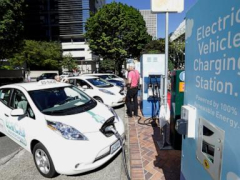Oregon could become the second U.S. state to require electric vehicle owners to enroll in a pay-per-mile program as lawmakers begin a special session Friday to fill a $300 million transportation budget hole that threatens basic services like snowplowing and road repairs.
Legislators failed earlier this year to approve a transportation funding package. Hundreds of state workers’ jobs are in limbo, and the proposal for a road usage charge for EV drivers was left on the table.
Hawaii in 2023 was the first state to create a mandatory road usage charge program to make up for projected decreases in fuel tax revenue due to the growing number of electric, hybrid and fuel-efficient cars. Many other states have studied the concept, and Oregon, Utah and Virginia have voluntary programs.
The concept has promise as a long-term funding solution, experts say. Others worry about privacy concerns and discouraging people from buying EVs, which can help reduce transportation emissions.
“This is a pretty major change,” said Liz Farmer, an analyst for The Pew Charitable Trusts’ state fiscal policy team, noting “the challenge in enacting something that’s dramatically different for most drivers.”
Oregon’s transportation department says the budget shortfall stems from inflation, projected declines in gas tax revenue and other spending limits. Over the summer, it sent layoff notices to nearly 500 workers and announced plans to close a dozen road maintenance stations.
Democratic Gov. Tina Kotek paused those moves and called the special session to find a solution. Republican lawmakers say the department mismanaging its money is a main issue.
Kotek’s proposal includes an EV road usage charge that is e





